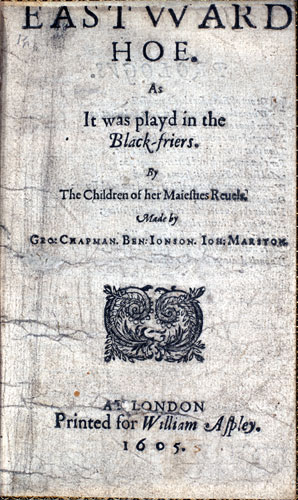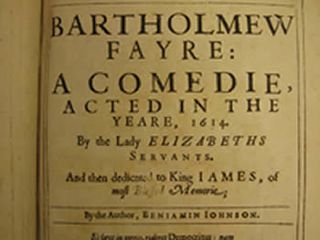
Benjamin Jonson was an English playwright and poet. Jonson's artistry exerted a lasting influence upon English poetry and stage comedy. He popularised the comedy of humours; he is best known for the satirical plays Every Man in His Humour (1598), Volpone, or The Fox, The Alchemist (1610) and Bartholomew Fair (1614) and for his lyric and epigrammatic poetry. "He is generally regarded as the second most important English dramatist, after William Shakespeare, during the reign of James I."

The cavalier poets was a school of English poets of the 17th century, that came from the classes that supported King Charles I during the English Civil War (1642–1651). Charles, a connoisseur of the fine arts, supported poets who created the art he craved. These poets in turn grouped themselves with the King and his service, thus becoming Cavalier Poets.

John Marston was an English playwright, poet and satirist during the late Elizabethan and early Jacobean periods. His career as a writer lasted only a decade. His work is remembered for its energetic and often obscure style, its contributions to the development of a distinctively Jacobean style in poetry, and its idiosyncratic vocabulary.
City comedy, also known as citizen comedy, is a genre of comedy in the English early modern theatre.
Sons of Ben were followers of Ben Jonson in English poetry and drama in the first half of the seventeenth century. These men followed Ben Jonson's philosophy and his style of poetry. Unlike Jonson, they were loyal to the king.

Volpone is a comedy play by English playwright Ben Jonson first produced in 1605–1606, drawing on elements of city comedy and beast fable. A merciless satire of greed and lust, it remains Jonson's most-performed play, and it is ranked among the finest Jacobean era comedies.

Eastward Hoe or Eastward Ho! is an early Jacobean-era stage play written by George Chapman, Ben Jonson and John Marston. The play was first performed at the Blackfriars Theatre by a company of boy actors known as the Children of the Queen's Revels in early August 1605, and it was printed in September the same year.

Bartholomew Fair is a Jacobean comedy in five acts by Ben Jonson. It was first staged on 31 October 1614 at the Hope Theatre by the Lady Elizabeth's Men company. Written four years after The Alchemist, five after Epicœne, or the Silent Woman, and nine after Volpone, it is in some respects the most experimental of these plays.

Sejanus His Fall, a 1603 play by Ben Jonson, is a tragedy about Lucius Aelius Sejanus, the favourite of the Roman emperor Tiberius.
The Isle of Dogs is a play by Thomas Nashe and Ben Jonson which was performed in 1597. It was immediately suppressed, and no copy of it is known to exist.
Eupompus was the founder of the great Sicyonic school of painting, which flourished in the 4th century BC at Sicyon in Ancient Greece. He was eclipsed by his successors, and is chiefly remembered for the advice which he is said to have given to Lysippus: to follow nature rather than any master.
"On My First Sonne", a poem by Ben Jonson, was written in 1603 and published in 1616 after the death of Jonson's first son Benjamin at the age of seven. The poem, a reflection of a father's pain in his young son's death, is rendered more acutely moving when compared with Jonson's other, usually more cynical or mocking, poetry. It is clearly different from the poem written about his daughter's death, which does not show the loss on such an intense level.

In English, the word laureate has come to signify eminence or association with literary awards or military glory. It is also used for recipients of the Nobel Prize, the Gandhi Peace Award, the Student Peace Prize, and for former music directors of orchestras who retain some level of involvement.

The comedy of humours is a genre of dramatic comedy that focuses on a character or range of characters, each of whom exhibits two or more overriding traits or 'humours' that dominates their personality, desires and conduct. This comic technique may be found in Aristophanes, but the English playwrights Ben Jonson and George Chapman popularised the genre in the closing years of the sixteenth century. In the later half of the seventeenth century, it was combined with the comedy of manners in Restoration comedy.

Thomas Thorpe was an English publisher, most famous for publishing Shakespeare's sonnets and several works by Christopher Marlowe and Ben Jonson. His publication of the sonnets has long been controversial. Nineteenth-century critics thought that he might have published the poems without Shakespeare's consent; Sidney Lee called him "predatory and irresponsible." Conversely, modern scholars Wells and Taylor assert their verdict that "Thorpe was a reputable publisher, and there is nothing intrinsically irregular about his publication."
"Drink to Me Only with Thine Eyes" is a popular old song, the lyrics of which are the poem "To Celia" by the English playwright Ben Jonson, first published in 1616.
Catiline His Conspiracy is a Jacobean tragedy written by Ben Jonson. It is one of the two Roman tragedies that Jonson hoped would cement his dramatic achievement and reputation, the other being Sejanus His Fall (1603).
Cynthia's Revels, or The Fountain of Self-Love is a late Elizabethan stage play, a satire written by Ben Jonson. The play was one element in the Poetomachia or War of the Theatres between Jonson and rival playwrights John Marston and Thomas Dekker.
The Case is Altered is an early comedy by Ben Jonson. First published in 1609, the play presents a range of problems for scholars attempting to understand its place in Jonson's canon of works.

Ben Jonson collected his plays and other writings into a book he titled The Workes of Benjamin Jonson. In 1616 it was printed in London in the form of a folio. Second and third editions of his works were published posthumously in 1640 and 1692.










